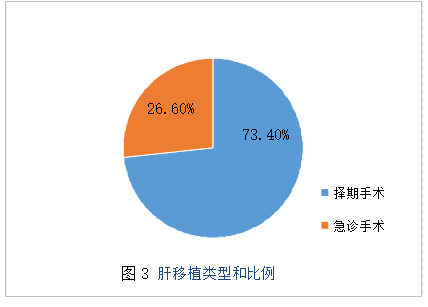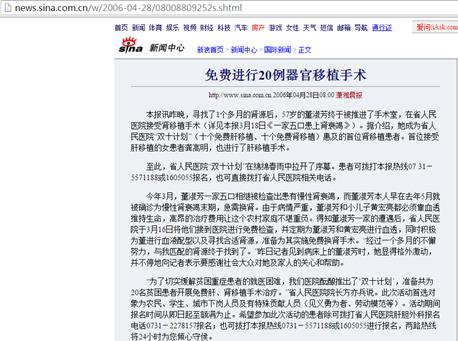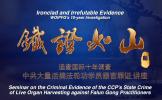Chapter Three: Chinese Tissue Typing Requires a Large Captive Population
Summary:This chapter will expose the why China was able to become number one in global transplants using reversed tissue typing. As we shall show, estimates based on reversed tissue typing concludes that in order to accomplish the number of organ transplants publicized officially, over 100,000 donors are needed for tissue typing–essentially, a huge live organ reservoir. That number is not compatible with the argument that death-row prisoners served as the source of organs. Falun Gong practitioners (and to a lesser extent Uyghurs and Tibetans) secretly detained in camps are the main plausible source, yet in the current conditions of an information blackout, it is hard to obtain the evidence of those secret camps. However, Falun Gong practitioners detained in prisons, labor camps, detention centers, and at home have been forced to have blood drawn on a large scale, which indirectly proves the existence of live organ reservoir for tissue typing.
Contents
I. During the Interview on March, 2015, Huang Jiefu Admitted Tissue Typing is Practiced in China. The CCP has Lied in Claiming that Death-Row Prisoners are the Sole Source of Organ Transplants.
II. Extremely Short Waiting Time Proves the Existence of Huge Live Organ Reservoir in China
III. The Massive Number of “Urgent Transplants” Indicates China Practices Reverse Tissue Typing and Killing People Based on Demand
IV. Many Hospitals Often Simultaneously Conduct More Than one Transplant Operation, Indicating the Existence of Large, Living Organ Pools
V. Case Study: One Transplantation Operation Employed Multiple Standby Donor Organs, with Two Spare Living Liver Donors, Revealing the Existence of Living Donor Pools for Organs and a Sophisticated Underground Operating System
VI. A Large Number of Expedited Transplantations in 2006 Proves the Existence of a Large Pool of Living Donors
VII. Reverse Matching Exposes the Existence of a Large, Living Organ Bank
VIII. Falun Dafa Practitioners Are Forced To Have Blood Tests, Which Is Powerful Evidence for the Existence of a Living Organ Bank
1. Nearly Every Falun Gong Practitioner Has Suffered from Both Physical and Mental Abuse as well as Being Forcibly Subjected to Blood tests while they are being detained
2. Falun Gong Practitioners Are Subjected to Forcible Blood Tests in Their Homes
I. During the Interview on March, 2015, Huang Jiefu Admitted Tissue Typing is Practiced in China. The CCP has Lied in Claiming that Death-Row Prisoners are the Sole Source of Organ Transplants.
Because of the wide coverage of medical insurance, the cost of organ transplant in most nations are covered by national medical insurance systems. Therefore, the donors are matched against a large number of patients in need of organ transplant for tissue typing. However, in China, due to the large income gap and the lack of medical insurance, among the over 300,000 patients in need of organ transplants, few of them can afford the expense.
Huang Jiefu denied that Falun Gong practitioners have been slaughtered for organs while freely admitting that death-row prisoners were being used as organ donors. On one hand, the CCP has been claiming that a large number of patients, 300,000 to 1,500,000, are in need of organ transplants. On the other hand, the CCP has been trying hard to conceal the real number of prisoners sentenced to death since this information is treated as a state secret. Nonetheless, even the most conservative CCP officials agreed that after 1998, the number has not exceeded 10,000.
If those death penalties can be matched against 300,000–1,500,000 for organ transplants, 6,000–10,000 cases of kidney transplants and about 3,000 cases of liver transplants could be conducted. It seems that the CCP can manage to explain the number of organ transplants.
However, in March 2015, Huang Jiefu contradicted his previous numbers when being interviewed by Phoenix Satellite Television[190]. He said that due to the cost of surgery, in China, the number of people waiting for organ transplants should be 22,000 instead of the 300,000 patients in need of such procedures. Huang’s words indicated that China practices reverse tissue typing, in other words, actively finding a match for the 22,000 patients among a certain number of donors. Thus, the number of death-row prisoners are far from enough as such a practice demands a huge live organ reservoir.
A simple calculation can help readers to understand how the lie has been revealed.
1) Assuming that prior to 2006, there are 10,000 death penalties, 20,000 patients can afford organ transplant surgery, and the tissue type matching rate is as high as 20-30 per cent as claimed by the CCP, 4,000–6,000 kidneys can be used if the physical condition of prisoners are not an issue and all of them can be used for tissue typing.
2) However, the number of kidney transplants reached 10,000 in 2004, according to CCP’s official publication, far exceeding 6,000. Because there were barely organ donors and live organ transplants at that time, the published number of organ transplants revealed that CCP had committed a massacre.
3) Furthermore, the number of death-row prisoners used for organ transplants should be much less than 4,000–6,000 due to the health condition of those prisoners (particularly the high rate of hepatitis), the management of those prisoners by different local judicial systems, the possibility of appeal by families of the prisoners if they find organs are missing, the short life-span of organs once removed from the body, and the time between the prisoners being executed and the surgery for the patient. Those are reasons why in 1998, organ harvesting peaked at only 3,700 cases.
4) The techniques of kidney transplant were well developed before 1998. Due to the factors stated above, the use of death-row prisoners for organ transplant was very stable. After 2000, the publicized number of kidney transplant exceeded 5,500 every year. It is evident that the organs were obtained illegally.
Based on statistics summarized by WOIPFG on organ transplants performed in different hospitals, we believe that by December 2014, the total number of organ transplant may well have exceeded 400,000 cases (310,000 cases of kidney transplants, 90,000 cases of liver transplants). If we remove the 30,000 cases performed prior to 1998, on average, 24,700 cases of liver transplants were performed each year, grossly exceeding the number of death-row prisoners. Given the tissue type matching rate of 6.5 per cent, at least 160,000 healthy donors were needed for tissue matching for kidney transplants and 100,000 for liver transplants. During the past 15 years, 2,150,00 donors – at a minimum - should be in the organ reservoir. Such a large number simply does not match the number of death-row prisoners. Even if the tissue matching rate were as high as 20–30 percent, as said by the CCP, 46,700 live, healthy donors – again, at a rock-bottom minimum, as we believe that reservoir was far higher - were needed in the organ reservoir.
II. Extremely Short Waiting Time Proves the Existence of Huge Live Organ Reservoir in China
It is well-known that the waiting time for organs in China is short. From 2003 to 2005, about 2,000 organ tourists went to China for organ transplants. The article titled “Worldwide Organ Transplant Investigation: Tens of Thousands Went to China for Organ Transplant, Mainland became the New Largest Organ Transplant Center”, published on Mar. 23, 2006 on Phoenix Weekly claims that “based on incomplete statistics, during the last three years, over 3,000 Koreans went to China for organ transplants and over 1,000 patients from other countries and regions [went to China] each year.[191]”
The largest organ transplant center in Asia, Orient Organ Transplant Center in Tianjin First Hospital, shows on its website that in 2005, 647 cases of liver transplant were performed and the average waiting time is only two weeks. The website was later removed but the cached pages can be found on the Internet[192].

Figure 2 Statistics of the Orient Organ Transplant Center show the waiting time is two weeks.
Yunnan Hospital of Nephropathy claims on its website that “it is guaranteed to find healthy kidneys in the shortest time possible” and “to provide donor organs with the shortest cold/warm ischemia time”;“(we have) organ transplant operations every week”; “(we are) the only transplant hospital in the country that matches donors to recipients”; “as long as the surgeons agree to perform a renal transplant, (we could) assure you a successful transplant”; “if not successful, we will repeat the transplant operation until it becomes successful”...
It is well known that Chinese hospitals are eager to make the sale, but the fact is that such guarantees are only possible when there is a large living renal source bank available on demand[193].
WOIPFG conducted phone investigations of over 1,000 doctors who perform organ transplants in mainland China, sampling across 30 provinces during March and December in 2014. The investigation reveals that almost all the hospitals capable of organ transplants are still aggressively expanding their business and commonly express that they have sufficient donors, young, healthy donors providing live, high-quality organs. In addition, the waiting time is extremely short. Many doctors promise they can obtain a matched organ within one to four weeks[194].
Table 3 Extremely Short Wait Time for Organ Transplant
|
Hospital |
Wait Time |
|
1.First Affiliated Hospital of China Medical University Transplant Research Institute
|
Liver transplants only takes a month and never longer than two months. Kidney transplants take a week and never longer than one month to find a HLA-matched donor. Although all donors are selected through strict examinations, the surgery will be canceled if an abnormality is found in the donor. The transplant center is responsible for selecting new donors for such patients and treats them as a priority and conduct a transplant again within a week[195]. |
|
2.Tianjin First Central Hospital Organ Transplant Center |
The statistics from the hospital itself shows that the average waiting time is two weeks[196]. |
|
3.Organ Transplant Center in Shanghai Changzheng Hospital |
The application form for liver transplants indicates that the average waiting time for liver transplant is one week[197] and the shortest time is four hours[198]. |
|
4.Organ Transplant Center in the Chinese People's Liberation Army No. 303 Hospital |
The voice record of the doctor says, “Usually the surgery can be done within 10 days or half a month. We have done a lot of them here…[199]” |
|
5.The First Affiliated Hospital of the Zhejiang University School of Medicine |
Zheng Shusen, director of the Multi-organ Combined Transplantation Research Key Laboratory of the Ministry of Health, said, “Donor should be found in one or two weeks … Every month there are dozens of cases …[200]” |
|
6.PLA No. 181 Hospital of Guangxi
|
The doctor said, “The surgery can be done within one or two months. We have confidence we can find a donor.” |
|
7.The First Affiliated Hospital of the Zhengzhou University |
The doctor said, “Donor can be found in one or two weeks.” |
|
8.People's Hospital of Zhengzhou |
Chen Guoyong, the main surgeon for liver transplant said, “Come here soon. We now have a lot of liver donors. Surgery can be done in a week.” |
|
9.Tongji Hospital Affiliated With Huangzhong University of Science and Technology |
Hospital staff said, “Liver donors can be found in no longer than three months. We have done a lot of those surgeries.” |
|
10.Nanjing General Hospital in Nanjing Military Region
|
Tang Ligong, the main surgeon for liver and kidney transplant said, “For liver transplant, you need to wait no longer than one month.” |
|
11.Zhongnan Hospital of Wuhan University |
PengGuizu, the director of kidney transplant, said, “Two months is the longest waiting time to find a kidney donor.” |
|
12.The Second Xiangya Hospital of Central South University |
Zhou Zhong, who is in charge of liver transplant, said, “The longest waiting time to find a liver donor is one month.” |
|
13.The Third Xiangya Hospital of Central South University |
She Xingguo, who performs liver and kidney transplant, said, “The waiting time for a donor is from one week to one month.” |
|
14.Beijing Chaoyang Hospital
|
Zhao Xi, who performs liver transplant, said, “To find a liver donor takes three months to half a year, not longer than half a year.” |
|
15.Beijing You’an Hospital
|
Staff in liver transplant department said, “it is not a problem to find a liver donor within half a year.” |
|
16.Peking University Third Hospital |
Staff in liver transplant center said, “It takes about half a year to find a donor.” |
|
17.The Second Artillery General Hospital of Chinese PLA |
Zhou Dinghua, vice chief officer of the hospital who performs liver transplants said, “Liver donor can be found in a month.” |
|
18.Fujian Medical College Affiliated Xiehe Hospital |
Chen Lingwan, the main surgeon for heart transplantation said, “it does not take half a year to find a donor.” |
|
19.Renji Hospital Shanghai Jiaotong University School of Medicine |
Dr. Qiu, who performs liver transplants said, “it is not a problem for our main surgeon, Xia Qiang. He can do the surgery in two or three weeks.” |
|
20.Nanjing Drum Tower Hospital, the Affiliated Hospital of Nanjing University Medical School |
Jiang Chunping, who performs liver transplants, said, “A Donor can be found in two months.” |
|
21.8.1Hospital of Nanjing PLA |
Wang Maorong, who performs liver transplants, said, “It takes two or three months at the most to find a liver donor.” |
|
22.First Affiliated Hospital of Suzhou University |
ShenZhenya, who performs heart transplants, said, “A donor can be found in about half a month.” |
|
23.People’s Hospital of Jiangsu Province |
A doctor said, “The waiting time is one week at the fastest and about a month at the slowest. That is very normal.” |
|
24.The First Affiliated Hospital , SunYat-sen University, Guangzhou |
A Doctor said, “we can do the transplant in about three months.”
|
|
25.The Third Affiliated Hospital of Guanzhou Medical University |
GuoXuekun, who performs kidney transplants, said, “It takes three months to half a year to find a kidney donor.”
|
|
26.The First People’s Hospital of Foshan City, Guangdong |
Chen Huanwei, the main surgeon for liver transplants, said, “In their hospital, he can do liver transplants. It only takes two or three weeks [to find a suitable donor].” |
|
27.Southern Hospital of Southern Medical University |
YangDinghua, who performs liver transplants, said, “It will not take longer than half year to find a liver donor.” |
|
28.Qianfoshan Hospital, Shandong
|
Hospital staff in the office of liver transplantation said, “TengMujian performs the surgery. It takes two or three months at the most to find a liver donor.” |
|
29.The Affiliated Hospital of Qingdao University |
Wang Xin, who performs liver transplants, said, “We just established an organ transplant center. The waiting time for surgery is one or two month, and the main surgeon is an expert from Beijing, ZangYunjin.” Wang Dong, the main surgeon for heart transplant, who worked for Qianfoshan Hospital and now performs surgery in both hospitals said, “The surgery can be done in one month at most. Donors are all healthy males younger than 35 years old.” |
|
30.The First Affiliated Hospital of Xi’an Jiaotong University |
Staff in the kidney transplant office said, “A kidney donor can be found at any time. There are many brain-dead.” Lu Yi, the main surgeon for liver transplants, said, “It is not a problem to perform a liver transplant in a month.” |
|
31.Tiexi Hospital of Angang |
“We bring the donor here by car. Beijing, Tianjin, and Shanghai always take the donor by air. People usually keep the best donor for their own hospital and the donor is usually used in two hours. We go to take the donor at 9:30, arrive at the hospital at 10:00, and perform the surgery at 12:00. All the donors are local, but this does not mean the donors are all from Anshan.” “40 or 50 transplants are performed during a year and this has been done for over two years. Organs are taken while the donors are alive.[201]” |
|
32.Zhongshan Hospital, Fudan University, Shanghai |
The doctor said, “The surgery can be done in a week after you come.[202]” |
|
33.The First Affiliated Hospital of Shanghai Jiaotong University |
Dr. Dai said, “Yes, we have donors. We have donors every day. We are doing such a surgery today.[203]” |
|
34. The First Affiliated Hospital of Jinan University |
Ding Hongwen, the main surgeon for kidney transplants in the Urology Department, said, “The surgery can be probably done in a month if it happens fast, depending on whether there is a match to your tissue tying report.[204]”
|
|
35.Yunnan Kidney Hospital
|
Its website claims that “It is guaranteed a healthy kidney can be found in the shortest time”, “the shortest cold and warm ischemia time”, “the only organ transplant hospital with donors looking for recipients”, “we have the confidence for successful transplant as long as the doctor agrees to perform a kidney transplant”, “if not successful, we will keep trying until a success” so on and so forth. Such warrantee can only be based on extremely large live organ reservoir[205]. |
III. The Massive Number of “Urgent Transplants” Indicates China Practices Reverse Tissue Typing and Killing People Based on Demand
Urgent liver transplants refer to patients with serious liver problem and on the verge of death. Usually they cannot survive more than 72 hours. Therefore, urgent transplant surgery needs to be performed. Due to the difficulty of urgent tissue typing, it is extremely difficult to perform an urgent liver transplant in other countries since the waiting time for a donor is too long. However, in China, there are as many as 1,150 cases of urgent liver transplant before 2006.
Annual Report on China Liver Transplant Registration, 2006, collected data from April 6, 2005–Dec. 31, 2006. Among the 8,486 cases of liver transplant in the 29 transplant centers, to one’s surprise, 1,150 cases were urgent liver transplants. In Changzheng Hospital, during the three years prior to April 2006, it claims: “In the last three years, our hospital has treated 120 patients with severe liver problems through urgent liver transplants.[206]”
Such a large number of urgent liver transplants indicate the existence of killing based on demand. As judiciary procedures should be followed to execute those who are sentenced to death, such as the confirmation of the Supreme Court and the specific time for execution, those who received death penalty can only rarely meet the 72-hour timeframe of urgent liver transplants.
Two surgeons, Fu Zhiren and Ma Jun from the Second Military Medical University-Affiliated Shanghai Changzheng Hospital’s Organ Transplant Department, mentioned in an article titled Prognostic Effects and Treatment of Emergency Liver Transplantation for Severe Hepatitis that they performed 120 cases of emergency liver transplants in the 3-years pan from 2003 to 2006. The organ recipients were severe hepatitispatients, and their average survival time after admission into hospital was three days. They claimed: “Only emergency liver transplant procedures could be performed, with the shortest time between admission and surgery being only four hours.[207]” We must conclude that there exists a live organ donor bank near this hospital.
ZhengShusen, from the hepatopancreatobiliary surgery department(a key laboratory under the Ministry of Health for multiple organ transplantation research)at the First Affiliated Hospital of Zhejiang University School of Medicine, mentioned in a research paper that from January 2000 to December 2004, the hospital performed 46 emergency liver transplant operations. All of the patients underwent orthotopic liver transplant operations within 72 hours of being admitted to the hospital[208].
Our investigation also found that the average waiting time for liver transplant elective operations was 1–4 weeks. That is, there is hardly any possibility that patients will die due to the lack of organs[209].
The liver transplant registration system only records part of the liver transplant statistics and only collected the statistics for 8,486 cases of liver transplants. According to Huang Jiefu’s report, 10,555 cases of liver transplants have been performed in China during the same period of time[210]. Thus, the number of urgent liver transplants could be larger.
Table 4 Type and Proportion of Liver Transplant
|
Type |
Number of cases |
Percentage(%) |
|
Elective Surgery |
3,181 |
73.4 |
|
Urgent Surgery |
1,150 |
26.6 |
|
Total |
4,331 |
100 |

Figure 3 Type and Proportion of Liver Transplant
IV. Many Hospitals Often Simultaneously Conduct More Than one Transplant Operation, Indicating the Existence of Large, Living Organ Pools
Many hospitals can conduct simultaneously several to dozens of kidney and liver transplant operations on the same day. It would not be possible to find so many executed prisoner donors with matching tissue typed organs, strongly suggesting that there is a large number of living donors banks, with blood types, and leukocyte _HLA histocompatibility antigens types all tested in advance.
Table 5 many hospitals conducted transplant operations in batches at the same time
|
Hospital |
Record of transplant operations in batches on the same day |
|
1. The people's Liberation Army Xinqiao Hospital of Third Military Medical University |
“Starting from 1998, the average number of cases of renal transplantation is 180.There is a record of 24 cases of renal transplantation in a single day.[211]”
|
|
2. General Hospital of the People's Liberation Army General Staff (No. 309 Hospital of the PLA) |
In April 2002, the organ transplant center of the whole army was set up[212]. This Center has a record of completing 12 kidney transplantations in one night[213].
|
|
3. Affiliated Southwest Hospital of the Third Military Medical University |
On Sept. 29, 2004, the Director of the Medical & Educational Department, GuoJiwei, led the leaders of the medical section officials visiting operating rooms and coordinated with the hepatology section, started 5 liver transplantations[214].
|
|
4. General Hospital of Jinan Military Region |
Qilu Evening News reported Li Xiangtie, the Director of Department of Urology, on March 21, 2005: "Under his leadership, the Dept. of Urology has many talents and a strong technical force, and can simultaneously take 6 kidney transplants operations and has created a national record of conducting 16 renal transplantations continuously within 24 hours[215]. And has done 7 transplantations perday 6 times, 32 cases in 1 week[216].
|
|
5. Fuzhou General Hospital of Nanjing Military Region |
On Jan. 17, 2006, the Fuzhou General Hospital simultaneously did 3 liver transplantations for the first time[217]. Feb. 18, 2014, at 12 o'clock, in the next 17 hours, 16 hepatobiliary surgeons completed 5 liver transplantations without sleep or rest[218]. |
|
6. Lanzhou Military Region Hospital No. 474 |
This hospital can complete 12 kidney transplants at one time[219]. |
|
7. Beijing Military Region Beidaihe Sanitarium |
As of April 2007, it completed 313 cases of renal allograft transplantation, among which there were 28 times when 6~9 renal transplantations were being done simultaneously[220].
|
|
8. Affiliated Shanghai Changzheng Hospital of the Second Military Medical University |
The official website of the Affiliated Shanghai Changzheng Hospital of the Second Military Medical University says that within 9 days from Apr. 22, 2005 to Apr. 30, the organ transplant center at the hospital had done16 cases of liver transplantation and 15 cases of renal transplantation[221]. |
|
9. Armed Police General Hospital |
On Apr. 6, 2005, under the command of Director Shen Zhongyang, the organ transplant center completed 5 liver transplants on patients who were 12 years to 62-years-old, including a female Korean patient and a 12-year-old child with Wilson disease[222]. |
|
10.Dongfeng General Hospital |
In August 2000, on the same day and at the same time, completed a large scale of organ transplantation activities including 10 cases of renal transplantation, 1 parathyroid transplantation and 3 cases of corneal transplantation[223]. |
|
11. The Third Xiangya Hospital of Central South University |
Once simultaneously did 2 liver transplantations and 5 kidney transplantations. The hospital has the capability to carry out 6-7 simultaneous transplantations, with yearly operations amounting to more than 200[224]. In the morning of Sept. 18, 2003, Huang Jiefu attended The Third Xiangya Hospital of Central South University’s "Hunan provincial engineering research center for transplantation medicine" founding ceremony. The transplant center at the hospital on that day "arranged" 7 liver and kidney transplantation operations[225]. |
|
12. The Second Xiangya Hospital of Central South University |
In The Second Xiangya Hospital of Central South University, it is often the case to do more than 10 operations in 2–3 days.They have successfully completed 9 kidney transplantations in one day[226]. |
|
13. Xi'an Gaoxin Hospital |
Founded in 2002, the organ transplant center has completed more than 500 cases of kidney transplants after 2 years of its establishment. An article on the hospital’s 10-year history of development says: "Regardless of the heat or the cold (weather), 4 to 5 people crowded in a beat-up van harvesting donors’ organs", and sometimes "(did) 7 to 8 transplantations in one day and night.[227]” |
|
14.Zhengzhou People's Hospital |
On Dec. 27, 2007, Director QuQingshan’s team at the renal disease and organ transplant Center, completed 13 kidney transplants in 21 hours[228]. |
|
15. The First Affiliated Hospital of Sun Yat-Sen University |
Mar. 14, 2006, the Guangzhou daily reported: “In recent days, at The First Affiliated Hospital of Sun Yat-Sen University operating rooms, reporters witnessed a scene of simultaneous operations of 5 liver transplantations, 6 renal transplantations... At one time the hospital transplant center did 19 kidney transplants in one day, and the highest record for liver transplantation is 6 operations together with 1 multiple-organ transplants in one day[229]. |
|
16. The First Foshan City People's Hospital |
On Dec. 29, 2005, the Dept. of Urology completed 7 renal transplantation operations[230]. From the morning of Dec. 28, 2004, to the morning of Dec. 28, in less than 24 hours, the First People's Hospital of Foshan City completed 5 kidney transplantations and 2 liver transplantations[231]. |
|
17. Dalian Friendship Hospital |
On Feb. 1, 2002, completed one liver and four renal transplantations in 14 hours[232]. |
|
18. Gongyi City Chinese Medicine Hospital |
The Renal Allograft Transplantation Center was founded in 2001[233]. The kidney transplant center can accommodate 12 kidney transplant patients at the same time. They could do up to 8 cases of kidney transplants in one day, and the transplant center's Urology director Li Honglu has carried out over more than 500 cases of allogeneic kidney transplantation[234]. |
|
19. The Shengli Oil Field Central Hospital |
On Apr. 26, 2002, did 6 kidney transplantations within 24 hours. On Oct. 27, 2002, did 5 cases of renal transplantations within 24 hours and 1 liver transplant. From Jan. 9 to 12, 2004, within 3 days, did 10 cases of renal transplantation and 1 liver transplant[235]. |
|
20. Qidu Hospital |
In the morning of Mar. 23, 2006, from 3:00 am to 9:00 am, completed 4 renal transplantations[236]. |
|
21. The First Hospital of Shijiazhuang City |
July 17, 2006, from 3 pm to 1 am the next day, with the Third Branch of Surgery Dept., the Urological Surgery Dept. successfully completed 5 cases of kidney transplantation in 10 hours[237]. |
|
22. The second Hospital of Lanzhou University |
Director of Urology, Yue Zhongjin, led the department and battled to complete 8 cases of renal transplantation in 32 hours[238]. |
|
23.Affiliated Wuhan Xiehe Hospital of Central China University of Science |
Official website said nearly 100 cases of orthotropic heart transplantations were completed in the recent 5 years and created the record of finishing 4 heart transplantations in the same day at the same time[239]. |
|
24. Taizhou Hospital in Zhejiang Province |
Once did 5 cases of renal transplantations in one day[240]. |
|
25. Xiangya Hospital of Central South University |
On Apr. 28, 2006, the organ transplant center finished 17 transplantation operations in one day. 7 late-stage uremia patients underwent kidney transplant surgery. On the same day they also finished 2 liver transplants and 8 corneal transplants[241]. |
|
26. Tianjin First Central Hospital |
Xinhua.net reported on Feb. 7, 2005, in Tianjin, Orient Organ Transplant Center at Tianjin First Central Hospital finished 108 cases of liver transplantation in the first month of this year (2005) (4 to 5 liver transplantations every day if 5 working days per week is counted) and 43 cases of kidney transplantation[242]. Some patients' families told the “Phoenix Weekly”, the transplantation center once conducted up to 24 cases liver and kidney transplantations in one day[243]. Orient Organ Transplant Center is capable of doing 9 liver transplantations and 8 kidney transplantations simultaneously[244]. |
|
27. Jiangxi Armed Police Corps Hospital |
In February 2002, theurological organ transplant center was set up[245]. In the next two years, the center did kidney transplantations for 260 patients inside and outside of the military. Once they continuously did renal transplant for 4 patients in 8 hours[246]. |
|
28. Guangdong Frontier Corps Hospital kidney Center in Shenzhen |
From Aug. 2, 2004, at 3 pm until Aug. 3 at about 2 am, in 11 hours, successfully completed the 6 cases of kidney transplants[247]. |
|
29. The First Affiliated Hospital of Zhejiang University School of Medicine |
In the First Affiliated Hospital of Zhejiang University School of Medicine, the nurses at the renal transplant ward said: "One day at the end of 2006, more than 30 kidneys came in, more than 10 people were shot in a day." On Jan. 28, 2005, Academician ZhengShusen at the transplant center completed 5 liver transplantations consecutively on the same day. ZhengShusen did 11 cases of orthotropic liver transplantations in a week[248]. |
|
30. West China Clinical Medical College (West China Hospital) |
Yan Lvnan: Can carry out 3~5 liver transplantations on the same day at the same time. Once we did 7 liver transplantations in a day[249]. A Huaxi Hospital nurse said, in a recording:“Once they did 6 kidney transplantations in a day. The kidney resources are abundant[250]. |
|
31. The Third Affiliated Hospital of Sun Yat-Sen University in Guangzhou |
In the evening of Feb. 10, 2004, 4 liver transplantations were finished, mastered by the head of the hospital, Chen Guihua[251]. |
|
32. The First Affiliated Hospital of Kunming Medical College |
On Jun. 24, 2005, did liver transplant surgeries for 3 patients[252]. |
|
33. Shanghai Renji Hospital |
Liver transplant center leader Xia Qiang cannot count himself on exactly how many liver transplant surgeries he has done. He can only remember his own record of 6 liver transplant surgeries in one day[253]. |
|
34. Shandong University Second Hospital |
On July 16, 2014, “Jinan Daily¡° introduced Wang Hongwei, director of the kidney transplant section. He once completed ten kidney transplants in one day[254]. |
V. Case Study: One Transplantation Operation Employed Multiple Standby Donor Organs, with Two Spare Living Liver Donors, Revealing the Existence of Living Donor Pools for Organs and a Sophisticated Underground Operating System
Tan Jianming, the director of Shanghai Organ Transplant Medical Center Clinic at Shanghai Jiao Tong University School of Medicine, personally performed more than 4,200 kidney transplants[255]. In 2003 Tan Jianming at Shanghai First People's Hospital did a kidney transplant for a patient. In the next two weeks, they tried to do blood and other matching tests from four kidneys with the patient. Due to the patient's antibody response, no matching kidney was found, and four kidneys were taken away. The patient then returned to his own country, and came back to the hospital after about two months. The hospital used four kidneys to do similar tests when eighth kidney turned out to match, and smooth completion of the transplant was finished. Dr. Tan told the organ recipient that the eighth kidney came from a convict[256].
According to reports on websites www.wlmqwb.com and www.sina.com.cn, in the afternoon of Sept. 28, 2005, while accompanying LuoGan, the then-Secretary of the CCP’s Central Politics and Law Committee, in attendance of the 50th anniversary celebration for the establishment of Xinjiang Uyghur Autonomous Region, the then-Vice Minister of Health Huang Jiefu demonstrated a transplant operation at the First Affiliated Hospital of Xinjiang Medical University. Huang used two living persons as spare livers for his operation.
After Huang Jiefu opened the abdominal cavity of a liver cancer patient named Yao Shufa, he discovered that his liver happened to meet the criteria for an autologous liver transplant, which he had dreamt about performing.
He then instructed the others to suture the incision, and immediately contacted Sun Yat-Sen University of Medicine First Affiliated Hospital in Guangzhou City and the Third Medical University’s Southwest Liver Medical Center in Chongqing City, requesting them to provide a spare liver each, in case the autologous liver transplant failure. According to “China Nurse”, matching livers were found in Gaungzhou and Chongqing several hours after the request on Sept. 28: “At 6:30 pm on Sept. 29, a matching liver arrived from Chongqing! Virtually at the same time, three medical personnel from Guangzhou the Third (Affiliated) Sun Yat-Sen Hospital also arrived with another matching liver and some bypass devices.[257]”
Huang Jiefu’s operation lasted from 7 pm on Sept. 29 to 10 am on Sept. 30, after 24 hours of observation, Huang announced the operation was successful; the spare livers were no longer needed.
In 2006, PRC’s Ministry of Health released "Specifications for technical management of liver transplantations" which requires that liver cold ischemic time should be less than 15 hours, therefore, the two spare livers brought from Chongqing and Guangzhou could only be two living persons. Otherwise, even just counting the 40 hours after the procedure to concluding if autologous transplants has succeeded, a liver cut early in advance should have failed for sure[258].
Typically, death-row executions are governed by strict requirements. Personnel from the courts and Prosecutor's offices must be present, the execution can only be performed after the prisoner is positively identified, check-ups are required also after the execution. In Huang jiefu’s operation, Chongqing and Guangzhou hospital personnel were able to walk with spare livers on airplanes, strongly suggesting that the living persons (donors) are special prisoners outside the judicial system.
VI. A Large Number of Expedited Transplantations in 2006 Proves the Existence of a Large Pool of Living Donors
WOIPFG’s investigation has confirmed that around Mar. 9, 2006, when the Sujiatun operation was exposed, there was a period of surprise, followed by expedited transplantation procedures. Many hospitals throughout the country suddenly had a lot of organs and medical personnel working overtime to catch up on organ transplants.
When Sujiatun incident was exposed, some hospitals in the northeast part of China were surveyed and said they had received instructions to temporarily suspend organ transplant surgeries. But after less than 20 days, that was, on March 27, the Ministry of Health issued “the provisional regulations on human organ transplant technology and clinical application management” and determined to be implemented on July 1[259]. After that, hospitals and major transplant centers around the country not only restored the organ transplants but also the number of operations increased significantly. Many hospitals across the country indicated that in April or May, there would be abundant organ donors. After that, it would be very difficult to get donors. At that time, WOIPFG’s investigations covered 23 provinces and autonomous regions, which meant that the Communist authorities expedited its actions in eradicating Falun Gong practitioners, in large numbers, who were used as organ donor pool, and the orders for this action came from the CCP.
Among them, the Hunan People's Hospital and even launched a commercial ad to give out “20 cases of free organ transplantations” (10 liver transplantations and 10 kidney transplantations), which indicated that the organs would be destroyed if not used, and they might as well exploit the situation by using it as an advertising opportunity(see the website snapshot below).

Figure 4 Hunan People's Hospital’s ad to give out “20 free organ transplant operations”
Table 6 Examples of expedited transplantations
|
Hospital |
Expedited transplant example |
|
Hunan Provincial People's Hospital |
People's Hospital of Hunan province in 2006 "double program" (ten free liver transplantations, ten free kidney transplantation[260]. |
|
Dongguan City Tai Ping People's Hospital |
Working overtime in the first three months of 2006 and have made 300 cases of renal transplantations[261]. Whereas they only made 360, 260, and 160 cases in 2003–2005. |
|
Shandong Qianfoshan Hospital |
Doctors in the hospital said that Falun Gong donors in April 2006 would be more available.The donors were now becoming gradually more[262]. |
|
Chengdu Air Force Hospital (PLA 460 Hospital, in 2004 it merged into PLA No. 153 Hospital) |
The investigation in May 2006 showed that a couple of months ago, Li Honghui from the Kidney Transplant Center at Yuquan Hospital, the Second Affiliated Hospital of Tsinghua University, was transferred to Chengdu, Sichuan, where there were more kidney donors, to assist the hospital for kidney transplantation. Director Xu Yahong at the hospital acknowledged that in May there were a lot of donors. Both men acknowledged (using) Falun Gong practitioners as donors[263]. |
|
The Second Affiliated Hospital of Guangzhou Medical College |
In 2006, recently there was a group of (donors) in the mid-late April. (Falun Gong) practitioners are healthier, the kidneys were all from young (practitioners) aged 20–30, without infectious diseases, AIDS, or syphilis[264]. |
|
Guangdong, Huizhou Union Hospital of Southern Medical University, |
There were many donors on April 11 and 12, 2006[265]. |
|
West China Hospital of Sichuan University |
Around May 2006, nurses at the West China Hospital said there were now sufficient organs: "Today we have done six kidney transplants.” |
|
Shaan xi Armed Police Corps Hospital
|
In 2006, a doctor said, “If you wanted to do it, it would be this Thursday. We would have a large number of donors on Thursday, on in the month of April. We will have them this week and next week and the week after the next week[266]!
|
|
Guangxi 181 Hospital |
In early May 2006 to the end of June, now we have donors. … Get over here now, (we can do) both liver and kidney transplantations at the same time[267]. |
|
Guangzhou General Hospital of Guangzhou Military Region Dept. of Urology (kidney transplant) |
Doctors said, kidney resources were rich. There would be live donors next Monday (April 11, 2006) aged 25-30[268]. |
|
First Affiliated Hospital, First Military Medical University of the Chinese People's Liberation Army (Guangzhou South Hospital) |
(Liver transplants): “Get here as soon as possible, we did it on Saturday. April 2006, there are many donors, several groups next week. … We do close to 100 cases a year. Come as soon as possible, Saturday, and Sunday would be all fine[269]. |
As for the donors mentioned by the doctors in the investigation, we used to consider them to be organs, like many readers. Yet while writing this report, prompted by Huang Jiefu’s operation in 2005 in Xinjiang, where he used two living persons as spare donors for liver transplantation while he conducted autologous liver transplantation, we reconsidered. The state media reported them all as spare livers, and considering the facts that they usually wouldn’t know when the patients arrive and the need that the patients must be matched with the (tissue/blood) types, we believe here that the “donors” mentioned by most hospital doctors were in fact, living human beings who were stationed nearby. They could be killed at any time for their organs according to the results from the blood/tissue type matching with the patients.
VII. Reverse Matching Exposes the Existence of a Large, Living Organ Bank
Dr. Pang Yubin, based on the above evidence and his own research, said that China currently has the "inverse matching" in organ transplantation, which is different from the rest of the world. Other countries have the so-called direct matching, where the patients in need of an organ have to wait for several years before finding a donor. However, China has inverse matching, where the organs wait for the organ recipients. Many Chinese hospital websites clearly state that a living donor can be found within a week[270].
VIII. Falun Dafa Practitioners Are Forced To Have Blood Tests, Which Is Powerful Evidence for the Existence of a Living Organ Bank
It is very difficult for us to obtain more evidence from those secret concentration camps [where Falun Gong practitioners are being held] because of the Chinese regime’s information censorship. However, blood tests done on Falun Gong practitioners, whether they are locked up in jails, labor camps, detention centers, or even at their own homes, indirectly confirm that the Chinese regime is building a database based on reverse organ matching.
1. Nearly Every Falun Gong Practitioner Has Suffered from Both Physical and Mental Abuse as well as Being Forcibly Subjected to Blood tests while they are being detained
In addition to the extensive physical and mental abuse, Falun Gong practitioners from all over China are being forcibly subjected to blood tests while they are being detained. A large number of Falun Gong practitioners, who are locked up in jails, labor camps, and detention centers, have suffered different abuses. Some were beaten, some were injured, others have become crippled or passed away (According to Minghui.org, a total of 3,861 deaths have been confirmed for practitioners, who were beaten to death.) They have all been subjected to blood tests, and they do not know the results of the blood test. If they are really sick, they cannot get any medical treatment. Neither can they post bail to seek medical treatment. All of these different treatments are common practices throughout China. Other than Tibetans, Uyghurs and some House Christians, none of the other detainees or inmates receives such treatment.
2. Falun Gong Practitioners Are Subjected to Forcible Blood Tests in Their Homes
Since April 2014[271], there have been cases of officials from the public security bureau and police breaking into the homes of Falun Gong practitioners and forcing them to have blood tests in Guizhou, Liaoning, Hunan, Hubei, and Beijing. When they couldn’t find Falun Gong practitioners, they forcibly withdraw blood from their relatives. Many of these cases took place in Guizhou and Liaoning, and some police even said they were simply carrying out orders from their superiors[272]. In Dandong, Liaoning Province, alone, there are a total of 16 Falun Gong practitioners, who have been forced by the local police to have their blood drawn[273].
References:
[190]“CAIJING.COM.CN”: Former Minister of Health:Sack of Zhou Yongkang Broke the Profit Chain of Organ Harvesting from Death Row Inmates (The article originally appeared on ifeng.com) March 16, 2015
[191]“ifeng.com”: Investigation into Tens of Thousands of Foreigners Coming to China for Organ Transplant, Mainland China Became Emerging Center for Organ Transplantation (writer/reporter Chen Yanhui)
[192]“OrientalOrganTransplantationCenter, www.ootc.net”: Introduction of the Center
[193]“Minghui, www.minghui.org” Investigation into Organ Harvesting: Kidney Transplant Hospitals Actively Recruiting Customers in Southeast Asia, and Other Leads
English: http://www.clearwisdom.net/emh/articles/2008/9/21/100822.html
Chinese: http://www.minghui.org/mh/articles/2008/9/12/185395.html
[194]“World Organization to Investigate Persecution of Falun Gong” Latest Investigations: The Massacre and Live Organ Harvesting from Falun Gong Practitioners by the CCP is Still Continuing. November 18, 2014
http://www.zhuichaguoji.org/node/45393
[195]“International Transplantation (China) InternetSupportCenter” About Organ Donors
[196]“OrientalOrganTransplantationCenter, www.ootc.net”: Introduction of the Center
[197]“LongMarchHospital Affiliated to the NumberTwoMilitaryMedicalUniversity”: Liver Transplant Application
[198]“Journal of Clinical Surgery” June 2006, Volume 14, Number 6, Prognosis Factors and Treatment for Serious Hepatitis Emergency Transplantation, Authors Fu Zhiren, Ma Jun
[199]“World Organization to Investigate Persecution of Falun Gong”Latest Investigations: The Massacre and Live Organ Harvesting from Falun Gong Practitioners by the CCP is Still Continuing, November 18, 2014
http://www.zhuichaguoji.org/node/45393#_4473501
[200]”World Organization to Investigate Persecution of Falun Gong”Latest Investigations: The Massacre and Live Organ Harvesting from Falun Gong Practitioners by the CCP is Still Continuing, November 18, 2014
http://www.zhuichaguoji.org/node/45393#_4473502
[201]“World Organization to Investigate Persecution of Falun Gong”Investigation Report on Organ Harvesting from Live Falun Gong Practitioners in Various Regions of China. Original version: April 16, 2006, Updated: April 22 and May 1
http://www.zhuichaguoji.org/sites/default/files/record/2006/04/699-guan_...
[202]”World Organization to Investigate Persecution of Falun Gong”: Collection of Evidences of Organ Harvesting from Live Falun Gong Practitioners by the Chinese Communist Party
http://www.zhuichaguoji.org/node/46728#_Toc366574832
[203]“World Organization to Investigate Persecution of Falun Gong”: Collection of Evidences of Organ Harvesting from Live Falun Gong Practitioners by the Chinese Communist Party
http://www.zhuichaguoji.org/node/46728#_Toc366574833
[204]“Sound of Hope” Organ Transplantation Doctor in Guangdong Province Said the Donor Source “Cannot be Openly Discussed”
[205]“Minghui, www.minghui.org” Investigation into Organ Harvesting: Kidney Transplant Hospitals Actively Recruiting Customers in Southeast Asia, and Other Leads
English: http://www.clearwisdom.net/emh/articles/2008/9/21/100822.html
Chinese: http://www.minghui.org/mh/articles/2008/9/12/185395.html
[206]“Journal of Clinical Surgery” June 2006, Volume 14, Number 6, Prognosis Factors and Treatment for Serious Hepatitis Emergency Transplantation, Authors Fu Zhiren, Ma Jun
[207]“Journal of Clinical Surgery” June 2006, Volume 14, Number 6, Prognosis Factors and Treatment for Serious Hepatitis Emergency Transplantation, Authors Fu Zhiren, Ma Jun
[208]“National Medical Journal of China” 2005, Volume 85, Number 49, pp 3460-3463. Clinical Evaluation of Emergency Liver Transplantation for Patients with Benign End-stage Liver Diseases. Authors Wang Weilin, Zheng Shusen, Xu Xiao, Liang Tingbo, Jin Jing, Shen Yan, Zhang Min, Wu Jian (Liver, Gallbladder, and Pancreas Surgery Department, Ministry of Health Key Laboratory of Multiple Organ Transplantation, The First Affiliated Hospital, College of Medicine, Zhejiang University, Hangzhou, 310003);
[209]“Department of Liver and Pancreas Surgery, Zhengzhou People’s Hospital”: Zhengzhou People’s Hospital Liver Transplant Expert’s Advice: Things to Keep in Mind about Liver Transplant (photo), May 20, 2014
[210]“Tomorrow's Organ Transplantation Program in China” Huang Jiefu
Madrid Conference on Organ Donation and Transplantation (The Madrid Conference on Organ Donation and Transplantation,March 23-25, 2010
[211]“Minghui www.minghui.org” Investigation Clue:Military Kidney Clinical Center Urinary Surgery Department “Carried out 24 Kidney Transplant Operations in One Day”
[212]“Xinhua Net, www.xinhuanet.com” Feb. 13, 2009, The 309 Hospital of the Beijing Military Region— Introduction to the Military Organ Transplantation Center
[213]“Good Doctor Online --- China’s Largest Medical Website”, Clinical Department of the 309 Hospital
[214]“Chinese Liver Transplantation Web”, May 10, 2005 Report: “Southwestern Hospital Carried out 5 Liver Transplants Simultaneously and Achieved Success”
[215]“Minghui www.minghui.org” Investigation Clue: MultipleLargeHospitals in Quancheng City, Shandong Province Suspected of Participating in Murdering Falun Gong Practitioners
[216]“Chinese Nursing Research” October 2002, Volume 16, Number 10, Analysis of Nursing 1007 Cases of Kidney Transplant Patients” Authors Liu Zhen, Wang Xiaoli, Wei Xiaohong, Jinan Military Region General Hospital, 250031
[217]“Xinhua Net, www.xinhuanet.com, Fujian Channel” March 25, 2006 “Fuzhou General Hospital Carried out 3 Liver Transplants Simultaneously for the First Time and Achieved Success”
[218]“Chinese Organ Transplantation Web, http://www.transplantation.org.cn “ No Sleep and Rest for 17 Hours and Completed 5 Liver Transplantation Operations, March 10 2014. Source: http://www.dnkb.com.cn, Writers and Reporters Huang Shuping, Wu Zhi
[219]“The 474 Hospital of the PLA” Organ Transplantation and BloodPurificationCenter
[220]“Chinese Journal of Convalescent Medicine” 2008 Volume 17, Number 01, pp 8-9: “Organization and Management of 313 Cases of Batch Kidney Transplantation of the Same Kind but Different Bodies”. Authors: Qiao Shufang, Zhang Jiyun (Area Number One, Beidaihe Sanatorium,Beijing Military Region,066100)
[221]“Minghui www.minghui.org” Investigation Clue:Investigation Report on Organ Transplantation in Shanghai
[222]“China Liver Transplantation Web”: Armed Police GeneralHospital Reached New Height in Liver Transplant Operations
[223]“DongfengGeneralHospital” Introduction to Organ Transplantation and Breast Surgery Department
[224]“Xiangya Number Three Hospital of Central South University”, Newsletter Number 9, March Toward the Ideal Kingdom of Transplantation Medicine --- Dean Huang Zufa Talks about Development in Transplantation Medicine
[225]“Xinhua Net, www.xinhuanet.com” Sept. 19, 2003, State Deputy Minister of Health Took up the Knife and Carried out Liver Transplant in CentralSouthUniversity. Source of report: CentralSouthUniversity
[226]“Hunan Online – Popular Health Page” Oct. 21, 2005 Dragons Fly and Tigers Leap --- Report on Kidney Transplantation Department of the Organ Transplantation Center at the Xiangya Number Two Hospital of the Central South University
[227]“GaoxinHospital of Xi’an” Official Website: 10 Years History of the Urinary Surgery Department, Sept. 5, 2012. Author Zhang Liuyong
[228]“China Etiquette Training Web” April 8, 2010. Etiquette Training for Doctors and Nurses --- Service in Zhengzhou People’s Hospital are Flagship and Brand Name Role Model
[229]“Guangzhou Daily” March 14, 2006, Renewing Life through Organ Transplantation
[230]“Foshan City Number One People’s Hospital” Urinary Surgery Department Completed 7 Kidney Transplants Simultaneously
[231]“Foshan City Number One People’s Hospital” Their Legacy Continues. SourceNumberOneHospital. Jan. 6, 2005
[232]“Dalian News Web” Dec. 25, 2006 “Chronicles of Organ Transplantation in DalianCityFriendshipHospital”
[233]“www.baike.com” Introduction of GongyiCityChineseMedicineHospital
[234]“ChinaYuxiKidneyDiseaseTransplantationCenter” Introduction to Expert: Li Hongdao
[235]“baike.baidu.com”Shengli Oil Field Central Hospital
[236]“Minghui www.minghui.org” Qidu Hospital Urinary Transplantation Center Carried out 4 Kidney Transplant Operations Overnight. April 4, 2006
[237]“Minghui www.minghui.org” Investigation Clue:Shijiazhuang City Number One Hospital Completed 5 Kidney Transplant Operations within 10 Hours Aug. 8, 2006
[238]“Good Doctors Online” Introduction to Doctor Yue Zhongjin
[239]“XieheHospital Affiliated to HuazhongUniversity of Science and Technology” Heart and Blood Vessel Surgery, Characteristics of this Field
[240]“TaizhouHospital” Introduction to Urinary Surgery Department
[241]“Newsletter of XiangyaHospital” May 14, 2006: Our Hospital Set New Record in Organ Transplants: Liver Transplant, Kidney Transplant, Corneal Transplant, 17 Operations Completed in One Day
[242]“Xinhua Net, www.xinhuanet.com“ Report on Feb. 7, 2005, Authors Lin Shuwen, Zhang Xiaohui
[243]“iFeng Weekly, www.ifengweekly.com” Number 5, 2006 “Investigation of Foreigners Coming to China for Organ Transplants”
[244]“OrientalOrganTransplantationCenter, www.ootc.net”: Introduction of the Center
[245]“Weimin Health Net” www.wmjk.net May 18, 2005 “JiangxiProvinceArmedPolice GeneralHospital
[246]“Sina Military, www.sina.com.cn” July 11, 2006 “Armed Police Jiangxi General Hospital Reached 98% Success Rate in Kidney Transplants”
[247]“paper.people.com.cn” People’s Daily Overseas Edition, Aug. 16, 2004Page 12. China Local News: ZhujiangDeltaShenzhenBorderDefenseHospital Completed 6 Kidney Transplant Operations. Reporter Huang Qi, Wang Meihua
[248]“China Liver Transplantation Web” May 1, 2005Academician Zheng Shusen Completed 5 Liver Transplants in One Day
[249]“SichuanUniversity Unions Net” Remember our Promise, Try Hard to Become Pioneer in Liver Transplantation
[250]“Minghui, www.minghui.org” Audio recording: Military Hospital Admitted Bluntly Using Kidneys from Falun Gong Practitioners
[251]“GuangdongOrganTransplantationResearchCenter – ZhongshanUniversityLiverTransplantationCenter” Feb. 23, 2006. “News from the Center” Article and Photo: Xu Pingge
[252]“Website of First Affiliated Hospital of the KunmingMedicalCollege”, April 11,2006. Introduction to Department: OrganTransplantCenter”
[253]“paper.people.com.cn”Xia Qiang : Young General in Liver Transplantation, by Huang Qi, June 23, 2006
[254]“Minghui www.minghui.org” China’s Propaganda Media Stir Up Attention to Stories behind Dark Curtain
http://www.minghui.org/mh/articles/2015/3/14/306242.html
[255]“paper.people.com.cn” Stories of Tan Jianmin
[256]“Bloody Harvest, The Killing of Falun Gong for their Organ" , Second Edition, pp 5, Feb. 25, 2007,David Matas and David Kilgour
[257]“iFeng Weekly, www.ifengweekly.com” Human Organ Trade in China, Story Behind the Dark Curtain, November 5, 2013
[258]“iFeng Weekly, www.ifengweekly.com” Human Organ Trade in China, Story Behind the Dark Curtain, November 5, 2013
[259]Ministry of Health Document, Wei Yi Fa (2006) #94
[260]“SinaNewsCenter” 20 Kidney Transplant Operations Free of Charge, April 28, 2006
[261]“www.renminbao.com” Urgent! Many Readers Wrote to us to Report that Hospitals in Mainland China Busy Murdering Witnesses (photo) April 17, 2006
http://www.renminbao.com/rmb/articles/2006/4/17/40113.html
[262]“World Organization to Investigate Persecution of Falun Gong: Collection of Evidences of Organ Harvesting from Live Falun Gong Practitioners by the Chinese Communist Party. Sept. 11, 2013, Updated March 2, 2015
http://www.zhuichaguoji.org/node/46728#_Toc366574838
[263]“Minghui, www.minghui.org” Audio recording: Military Hospital Admitted Bluntly Using Kidneys from Falun Gong Practitioners
http://www.minghui.org/mh/articles/2006/5/2/126638.html
[264]“World Organization to Investigate Persecution of Falun Gong”Investigation Report on Organ Harvesting from Live Falun Gong Practitioners in Various Regions of ChinaOriginal version: April 16, 2006, Updated: April 22 and May 1
http://www.zhuichaguoji.org/node/699
[265]“World Organization to Investigate Persecution of Falun Gong”Investigation Report on Organ Harvesting from Live Falun Gong Practitioners in Various Regions of ChinaOriginal version: April 16, 2006, Updated: April 22 and May 1
http://www.zhuichaguoji.org/node/699
[266]”World Organization to Investigate Persecution of Falun Gong”Investigation Report on Organ Harvesting from Live Falun Gong Practitioners in Various Regions of ChinaOriginal version: April 16, 2006, Updated: April 22 and May 1
http://www.zhuichaguoji.org/node/699
[267]”World Organization to Investigate Persecution of Falun Gong”Investigation Report on Organ Harvesting from Live Falun Gong Practitioners in Various Regions of ChinaOriginal version: April 16, 2006, Updated: April 22 and May 1
http://www.zhuichaguoji.org/node/699
[268]”World Organization to Investigate Persecution of Falun Gong”Investigation Report on Organ Harvesting from Live Falun Gong Practitioners in Various Regions of ChinaOriginal version: April 16, 2006, Updated: April 22 and May 1
http://www.zhuichaguoji.org/node/699
[269]”World Organization to Investigate Persecution of Falun Gong”Investigation Report on Organ Harvesting from Live Falun Gong Practitioners in Various Regions of ChinaOriginal version: April 16, 2006, Updated: April 22 and May 1
http://www.zhuichaguoji.org/node/699
[270]“The Epoch Times” April 5th, 2006 report, titled “Medical expert: There exists a large live organs’ warehouse in Sujiatun”.
[271]“The Epoch Times” Sept. 19th report, titled “The police in Dandong claimed that Falun Gong practitioners forced to take blood test is mandated task – Terrible secret hidden behind”.
http://www.epochtimes.com/gb/14/9/19/n4252384.htm%E6%B3%95%E8%BD%AE%E5%8...
[272]Minghui.org July 5th, 2014 report, titled “Policemen in more areas visit Falun Gong practitioners at home, forcing them to take blood test.”
http://www.minghui.org/mh/articles/2014/7/5/%E5%A4%9A%E5%9C%B0%E8%AD%A6%...
[273]“The Epoch Times” Sept. 19th report, titled “The police in Dandong claimed that Falun Gong practitioners forced to take blood test is mandated task – Terrible secret hidden behind”.
http://www.epochtimes.com/gb/14/9/19/n4252384.htm%E6%B3%95%E8%BD%AE%E5%8...




























































